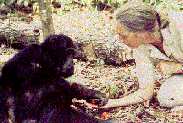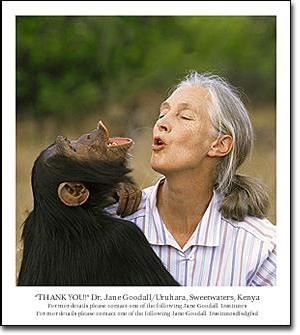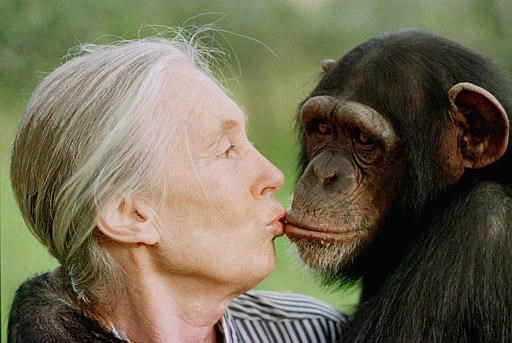"I had a wonderful supportive mother. She encouraged me to follow my ridiculous dream to go to Africa and live with animals because I was in love with Tarzan... Everyone else laughed at me but she said 'Jane, if you really want something, you work hard, take advantage of opportunity, and never give up. You will find a way.'"
"I was fortunate enough to meet the late Louis Leakey, who gave me this amazing chance to go and try to find out about the Wild Chimpanzees, our closest living relatives in the animal world.... That study began in the sixties and is now in its 43rd year. When I go back there, I see some chimpanzees that I knew in the sixties, and one individual, her name is Fifi. She was a little baby when I arrived in 1960 and she's about 43 years old now, she's the matriarch of her community. She's had a very successful reproductive career. When I look into her eyes, this grand old lady, I think 'this is my oldest chimpanzee friend, and she and I share memories that no other being in the world shares because they're not there any more.' And when I look into those eyes, I know I'm looking into the eyes of a thinking, feeling being. But I'll never know what she thinks about me. It's always a mystery, there's always something to learn..."
Click here to read the entire speech.
 |
Jane Goodall, born April 3, 1934, had an early connection with animals. It is said that when she was six years old, her father brought her a chicken's egg, intending her to raise the bird as a pet. His friends warned him that this was not an appropriate gift for such a young child, but Jane loved the gift. It was the first pet she ever had.
As Jane started to get older, she became more and more interested in animals and wanted to get a job working with them. She went to Africa and met the world famous anthropologist, Louis Leakey. He asked her to work for him at Gombe National Park to watch the wild chimpanzees and record everything she saw.
She had a wonderful time there. It was the first time she had ever seen a chimpanzee face to face. She wasn't that close to them at first because they would run away. When they finally got used to her she was able to be right next to them. She enjoyed this very much.
She got very close to the chimps in their environment and they learned to trust her. She saw everything from the mating seasons to the birth of babies as well as their fights with others.
Ethology is the study of animal behavior, and Goodall has become the most famous ethologist in the world because she saw chimps doing things no one else knew they did. Not only is she popular with the general public, she has a very good reputation with breeders and conservationists.
The Jane Goodall Institute sponsors an environmental organization for people from preschool to college called Roots and Shoots. According to their website, the purpose of Roots and Shoots is to "foster respect and compassion for all living things." Jane has taught me that if we as humans show compassion for animals, they will show compassion for us.
As a schoolgirl in England Jane Goodall's first dream of going to Africa was when she fell "madly in love" with Tarzan!
 |
Jane Goodall is a British ethologist and authority on wild chimpanzees. Born in London in 1934, and educated in Bournemouth,  Jane worked in Africa for the British anthropologist Louis S. Leakey, at whose suggestion she set up a camp in 1960 in the Gombe Stream Chimpanzees Reserve on Lake Tanganyika. For nearly ten years she studied the rarely observed lives of the chimpanzees.
Jane worked in Africa for the British anthropologist Louis S. Leakey, at whose suggestion she set up a camp in 1960 in the Gombe Stream Chimpanzees Reserve on Lake Tanganyika. For nearly ten years she studied the rarely observed lives of the chimpanzees.
Now Goodall spends most of her time teaching at universities around the world, lecturing on her experiments at Gombe and speaking to school groups.
Jane Goodall once said: "Chimpanzees have given me so much. The long hours I spent with them in the forest have enriched my life beyond measure. What I have learned from them has snapped my understandings of human behavior, of our place in nature."
If you would like to purchase a copy of the Jane Goodall "Thank You" poster (above) please visit The Jane Goodall Institute.
Page created on 6/29/2004 3:17:51 PM
Last edited 3/16/2020 6:59:37 AM
| Julian from Los Angeles writes: |  |
Dr. Shirley McGreal of Summerville, South Carolina, has devoted her life to saving and caring for Gibbons and other primates who have been discarded by medical laboratories, illegally trafficked primates (many of whom lost their mothers and fathers to poachers), and abused primates that were purchased by unenlightened individuals who wanted a primate as a pet. She has put her own life on the line many times to save these friends of the animal kingdom. She is my hero!
For more information visit the Dr. Shirley McGreal hero page. | |

She (also) encouraged the teachers to join Roots and Shoots, small groups of young people who adopt projects showing concern for the environment, animals and their communities." One Roots and Shoots participant, sixteen-year-old New York City resident Deland Chan, recently received a David Brower Environment Award.